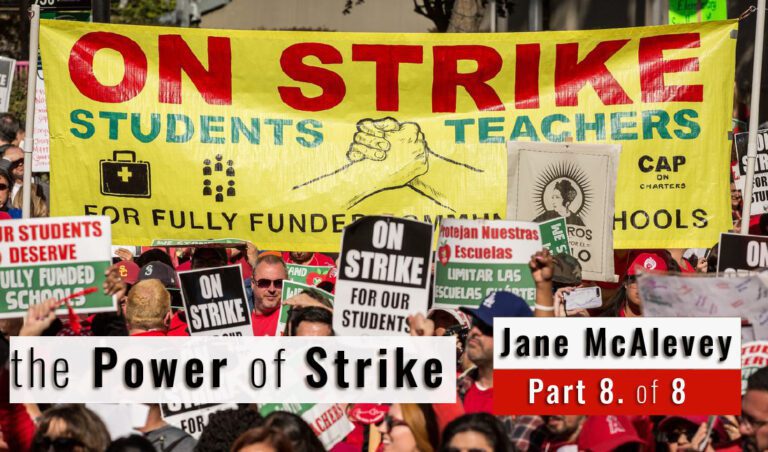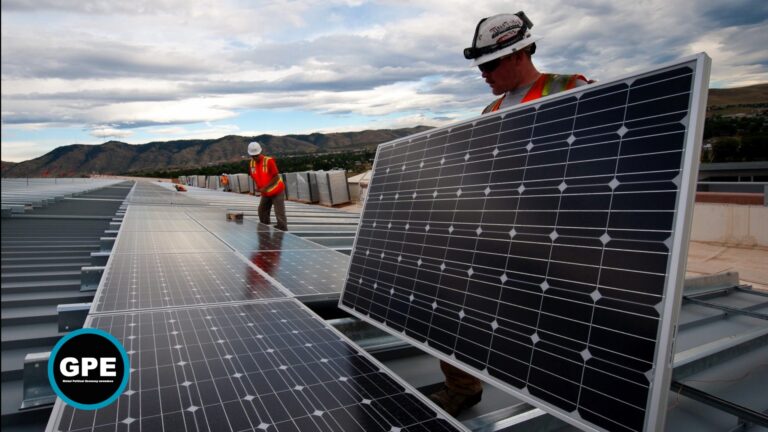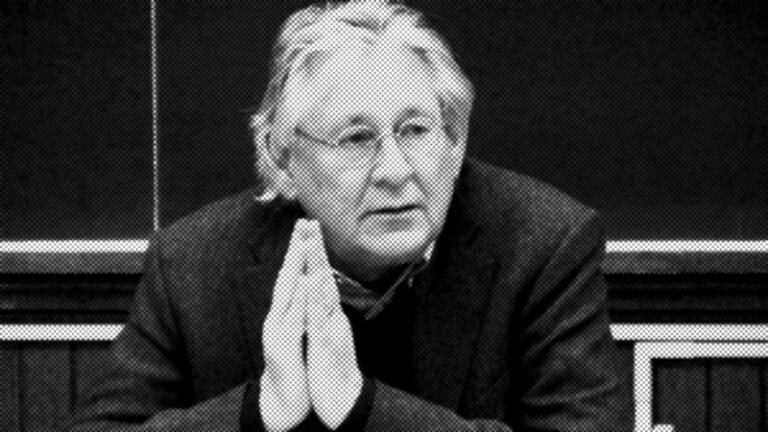Podcast: Play in new window | Download | Embed
Subscribe Apple Podcasts | Spotify | Android | iHeartRadio | Blubrry | Email | TuneIn | Deezer | RSS
Marches in Michigan’s mostly white suburbs and small towns in support of the protests against police brutality could have a large impact on the struggle of autoworkers, says veteran union leader and activist Frank Hammer on theAnalysis.news with Paul Jay.
TRANSCRIPT
Hi, I’m Paul Jay. Welcome to theAnalysis.news podcast.
If the movement in the streets is going to be a mass movement with sustainability and power to bring about transformative change, the working class—particularly the unionized working class, which includes workers of all colors—needs to wake up and fight for progressive politics, including within their own unions.
Most of the major unions, but not all, have allied themselves with corporate Democrats and have been a force for the status quo rather than real change. On theAnalysis.news, we’re going to pay a lot of attention to the struggles inside the unions to elect a leadership that actually represents the workers and not just feathers the nests of an elite stratum of union officials. Perhaps the most critical struggle that workers and unions must take up is for a Green New Deal that addresses the urgency of the climate crisis.
My guest today has been involved in this struggle for decades. He’s been a leader in raising the issues of the climate crisis within the context of the economic and immediate labor struggles. Frank Hammer was based in Detroit for over 50 years as a labor activist and leader, fighting for social and environmental justice.
He’s a former president and bargaining chair of UAW Local 909 and General Motors at Warren, Michigan. And he’s a retired UAW–GM international representative. He’s cofounder of the Autoworker Caravan and cochair of the International Auto Workers Council, GM section, and is a leading member of several worker solidarity networks within the UAW and in the U.S. and global labor movements. In other words, Frank Hammer is a born organizer. Thanks for joining us, Frank.
Frank Hammer
Thank you, Paul. Glad to be here.
Paul Jay
So start with what’s going on now in Detroit, in the streets, and how this might affect the workers’ movement in Detroit.
Frank Hammer
Like so many other cities across the U.S., there has been such an upsurge of response to the immediate incident with the murder of George Floyd, but it’s, of course, much broader than that. So we have had numerous demonstrations here in the city. And to tell you, we have had demonstrations in small towns outside of Detroit. We’ve had demonstrations in the suburbs of Detroit. And if you know anything about my city, it’s one of the most segregated regions in in the U.S., you know, as Detroit is an 85 percent African-American town.
And to see the demonstrations not only in the city where you would maybe anticipate them, but also to see them in places like Troy, which is 6–8 miles north of Detroit, which is mostly a white suburb; to see them in Sterling Heights, which is mostly a white suburb—these are areas where there are auto workers and retired auto workers. I think it’s going to have a very powerful impact on the labor movement because it’s showing visibly the solidarity that exists that maybe otherwise might not have been anticipated.
Paul Jay
The thing with the history of the autoworkers in Detroit, it’s certainly changed to some extent after 2007 and 2008. But autoworkers used to do really well. I mean, it was not abnormal for autoworkers to assume they’d have a couple of cars in the garage. They didn’t—never had to worry about getting fed. Many of them even owned cottages. They assumed they could afford to send their kids to university. They were really in the privileged, to a large extent, upper stratum of the working class.
Now, in 2007 and 2008, a lot of that changed, especially for workers entering the auto industry. I believe they went from a starting wage of, what? Twenty-six bucks an hour, or something, down to 12–14 bucks an hour, which is a drastic drop. In fact, I think it’s you who told me once, Frank, that it’s for the first time autoworkers—newly hired autoworkers—will be the first auto workers who cannot afford to buy a car.
But this pandemic is changing, and I would think even more drastically where workers who thought could never, I should say never could imagine they could be poor in poverty without income. This has got to be putting a scare into a lot of people in Detroit that never thought they’d face that. Now, that’s not just white workers, I must say, because, you know, there’s a lot of black workers that were doing relatively well in the auto industry, but what is the future of that?
Frank Hammer
First of all, it’s quite true that – in the year before the financial meltdown in Wall Street and the consequent threatened bankruptcy of GM, Chrysler, and Ford – is when the UAW and the “Detroit 3” began to implement the cuts that you’re describing, including the fact that new workers came in at half of the wage rate as the seniority workers.
And also lost, for example, any right to a pension they were given. Instead, they were negotiated 401 K plans and health care was reduced. And so on, and in many different ways. And this was all before the bankruptcy. So the bankruptcy actually came on the heels of concessions that were already severe. Concessions were already made in the auto industry. And I think that it would be important to note that the GM strike, the UAW GM strike that occurred last year, I think was a belated response. And it was a pent up, pent up anger about what had happened to the ranks of autoworkers. And without a lot of preparation by the UAW leadership – I would say it was dismal – workers persevered and weathered a 40-day strike, which had not happened for 40, 50 years. They attempted to, you know, return to what they had previously known to be what autoworkers’ lives were like, and what I saw in that – and I think was also a precursor to what we’re seeing now – is that the rank and file solidarity that I witnessed on the picket line was really quite astounding, given that there wasn’t a lot of preparation for the strike.
And you had workers, and I want to give a particular example of my plant. My plant, which is closed – was closed, I should say – was down to like a handful of workers and not enough to, you know, people a picket line.
We had Ford workers, we had Chrysler workers that came to the GM picket lines to swell our ranks and to support the struggle of the GM workers. So you have that precursor of all these cuts and multiple tier creations and subcontractors within the factory and all of this negative drag down of the U.S. working class and autoworkers. And you had a response, you had a response to it in that 40 day strike. And certainly, under a different kind of leadership, it would have had different results. But it really stands out. And I believe that that had a lot to do with the kind of solidarity that is being expressed now in the face of, not only the pandemic, but also the question of Black Lives Matter.
Paul Jay
So you were chair of a large bargaining unit for many years. What was, and to the extent that you can talk about now, what was the relations between white and black workers, especially in the midst of struggles like that?
Frank Hammer
So, you know, we’re speaking of the 90s, in the 80s and 90s. And I can tell you that white and black workers rubbed elbows every day in my factory. And you could see, both how factories served to integrate the working class, you could also observe at the end of the shift, if you stood out by the gate and saw where the cars were going, you could see that the majority of the white workers were driving north to, you know, to the suburbs, and the majority of black workers were driving south to Detroit.
So, clearly, we were living in a segregated environment, but the factories are where we came together. And even though you would see black workers and white workers maybe hanging out in different groupings in the cafeteria or in the rest areas, there was still amicability between white and black workers that I fear, with the closing of plants, you know, begins to get lost. But I would say, generally speaking, certainly in my plant – which is a suburban plant – there was a surprising amicability and solidarity between white and black workers. And, you know, maybe the sequel to that was shown on the picket lines. But we have fewer factories that are operating and, therefore, less solidarity on a day to day basis.
Paul Jay
So then what do you make of these protests breaking out in white suburbs in support of the movement against police repression and such?
Frank Hammer
So, I believe that – especially, I think in the context of the pandemic, with all of a sudden we have the layoffs of 30 or 40 million workers – I can’t imagine that has not had an impact on people feeling that they’re getting a really raw deal – and all of a sudden they’re out of work. And it’s a result of this slow response by the Trump administration and many deaths. We’ve had, I think, at least 5,000 deaths here in Michigan, many of them here in Detroit. But I got to tell you that when we had the strike, the solidarity between white and black workers in the GM strike was just exceptional.
And to me, it expressed an undercurrent of working-class solidarity, the pigment of your skin be damned. That’s what I got from the GM strike, and I think that’s what I’m seeing in these actions in the suburbs, but I know you’d have to add: these are young workers. These are young people mostly who are out and doing that. And I think young people have their own crisis that they’re encountering, whether it be, you know, the questions of being able to go to a university, whether you’re going to have a future considering what’s going on with the climate crisis. I think there’s a lot of angst among young people, and I think that also explains why they’re out there. And I think that it was unmistakable that the police actions against black people are beyond deniability. It’s the media and the social media especially that has exposed that, and they’re not going be able to put it back in the box. People understand there is an enormous racial inequity, and it really comes out terribly in the pandemic, and it comes out terribly in the police violence.
Paul Jay
Well, we’re going to be doing another podcast soon with Frank and one of his colleagues from the UAW. And we’re going to dig in more into some of the union politics and how this pandemic and how this uprising is affecting that. But, as I said in the introduction, perhaps the most important thing that we need workers to take up, along with the day to day struggles in trying to overthrow this conservative union leadership in many of the unions, the issue of climate is critical.
And it’s interesting because there are “woke,” to use the word, workers who are organizing and with a very laser focus on the issue of climate. Frank’s one of them and working with them. So start by talking about––you went to a conference in South Africa, which was an Auto Workers, International Auto Workers Conference. So what was that about?
Frank Hammer
So there has been an effort underway by militant workers in Germany to begin to form an international rank and file workers’ autoworkers organization to address the crises that auto workers face globally. And these efforts began well over a decade ago. And by 2015, they had gotten themselves organized enough that they actually had founded the organization, which is the International Automotive Workers Council or Conference. And they formed in 2015. And they created an agenda, and they scheduled a future conference to consolidate the organization. And that’s what took place, not in Germany, but in South Africa, just on the outskirts of Johannesburg. And it was a very deliberate political decision to do it in the global South so as to reach out to the autoworkers in the global South.
So we had 19 different countries represented, somewhere between 250 and 300 people, and actually had 42 delegates representing some of those countries. Over the course ofa few days we deliberated and came up with a document that the overwhelming majority of the workers agreed with that were represented there. And one of the – well you know, there are several economic planks, including the call for a global 30 hours work, 40 hour paid movement, which is very pressing in terms of creating employment and workers being compensated for their productivity. But it also zeroed in on the climate and the environmental crisis, more generally, saying that the auto workers of the world need to collaborate, support and join with the militant environmental movement for the conversion of the auto industry for renewable energy and the green economy.
And it’s been a development that’s been coming forward in the last, I want to say, six or eight years. And along with just the autoworkers meeting where they agree to all this, there was also the formation (back in 2014) of something called the “Environmental Union.” And the Environmental Union is really the organization where they want to see the collaboration between militant environmentalists and the militant auto workers movement. So it was very heartening to see that this was the focus. It is very challenging for autoworkers who are confronted with all kinds of struggles regarding plant closures, regarding multi-tier wage structures that are being implemented by the companies and so on, to take their eyes off of those day to day life struggles to see that we have overarching struggle regarding our industry’s role in bringing on what can be described only as a climate catastrophe with carbon, you know, greenhouse gases and carbon emissions.
So it was a call that the autoworkers bring back to their own countries, and want to promote. And we’re saying that autoworkers need to understand the environmental movement better; autoworkers need to bring the environmental movement into their ranks. And at the same time, the environmental movement has to step up and support workers’ struggles. So that was the gist of it.
Paul Jay
So you’re also involved in something happening in Oshawa, Ontario, Canada, something called Green Jobs, Oshawa. What’s going on there?
Frank Hammer
So it’s kind of, what I would describe as, an implementation of what this conference was promoting. And the implementation in Oshawa is taking place at the GM Oshawa plant, which along with my plant, was closed in 2019. And some of the workers in the Unifor Local 222 there, who are farsighted and saw that we must move to a conversion, and to repurpose this incredible Oshawa facility toward the making of – in their case, we’re talking about making electric vehicles. And the electric vehicles that they had in mind were for production, for government use, including for the Postal Service and all kinds of other mass uses that the government could put electric vehicles.
And they have been saying, in the Oshawa Green Jobs, that they want to see the nationalization, the government takeover of the Oshawa facility in order to implement production of battery driven vehicles. So that movement has been going on for a while now, and they’re making some headway, but they’re not getting support from the Unifor bureaucracy, which you were referring to earlier.
Paul Jay
Yes, that’s the name of the, what used to be CAW Canadian Auto Workers, was called Unifor in Canada. And they’re not getting support? Why?
Frank Hammer
So, you know, it’s like, you know, it’s like favoring the corporate agenda and not challenging the question of government proprietorship over this complex – very reticent to move in that direction. That’s true also of my UAW. And it’s unfathomable because I’m sure you can see some words somewhere about where they are concerned about climate change but – when it really gets to the point of, well, what are we going to do about it? – they’re reticent to do anything at all.
So, yeah, Green Jobs Oshawa is operating on its own. But now with the advent of the Corona virus and COVID–19, they are now saying, let’s convert the plant to manufacturing PPE, whether it be masks or the N95 masks and so on.
But the whole idea is: we’ve got to put these abandoned factories to some useful social product that we can use in the current crisis. And I just want to tell you that – with that going on in Oshawa – that here in the U.S. by public pressure, Trump was sort of forced into doing the same thing in regards to my plant and another GM facility in Kokomo, Indiana, whereby my plant was reopened to produce masks. And we are producing the masks and the N95 masks at my facility, which, you know, used to make transmissions.
Paul Jay
But not with public ownership, but under this Wartime Powers Act or whatever it‘s called, he was able to order them to——
Frank Hammer
So there was this – unbeknownst to me and unbeknownst, I’m sure, to a lot of people – there was the Defense Production Act that was passed around 1950 in anticipation of the Korean War. It enabled the government to mandate production and the products that we required, and mandate companies to produce them, much in the line of what was done with the Arsenal of Democracy, what we call the Arsenal of Democracy, in the lead up to World War II, where, by government mandate, U.S. companies, car companies were mandated to stop production of vehicles for the production of warplanes and tanks, and so on.
So it has that kind of a flavor to it. Trump was reticent to use that authority to compel GM to do that. But the reality is that it’s happened and it’s a bit of an aspect – without nationalizing the GM plant – It is a move in that direction that is saying the government can mandate what society needs in production facilities, especially ones that have been abandoned, but ultimately, in all of them——
Paul Jay
The thing is in Canada, public ownership is not as alien a concept as it seems to be in the United States, although, frankly, there’s quite a bit of public ownership in the U.S., too, that just never gets talked about. For example, there’s a lot of hospitals that are state owned hospitals and so on. But in Canada, you have the liquor license LCBO, Liquor Control Board of Ontario, does all the liquor sales in British Columbia. I believe also in Quebec. But in B.C., you’ve got public auto insurance. So it’s not so crazy for the government to take over something. On the other hand, they don’t like the idea, I suppose, of opening the door to having to take over public ownership for the purpose of dealing with climate change, because it’s obvious that’s the only way you’re really going to get it done. The marketplace won’t do it.
Frank Hammer
And, you know, I mean here in the U.S., of course, the struggle, the leverage has been in the other direction where this constant privatizing, privatizing and privatizing—-And, yes, we are confronted with the notion that we have to reverse the privatization of public assets and put in public ownership that which is currently in private assets. So, that is the struggle. And, you know, I think that with a Corona virus and the pandemic, that it begins to reveal to everyone that the private based capitalist economy is not designed to deal with the public good. So, you talked about hospitals: how many are now privatized for profit ventures that their maximization of profit meant that they hardly had any vacant beds on any given day?
Paul Jay
Yeah, because they didn’t want to empty beds of elective surgeries that are far more profitable, and even the big non-profit hospitals like Johns Hopkins and others, the fact is they’re actually run as if they were for profit. They have the same kind of bottom line to worry about, and then the same reluctance to open up beds. Where, in Canada, at least because their hospitals are publicly owned – but there’s lots of problems what happened up in Canada as well. where I happen to be right now. But they were able to allocate resources far more rationally and efficiently than happened in the United States
Frank Hammer
And, to come back to the question of climate. So to me, maybe the silver lining – if there is one – to the Coronavirus and COVID–19 is that, it’s kind of a public demonstration of: we are not prepared for crises of that nature. And the climate crisis, which, of course, has sort of evaporated on the U.S. media because that’s the last thing that they want to talk about, is the climate crisis and the environmental crisis.
Paul Jay
And it wasn’t much there to begin with.
Frank Hammer
Absolutely. But, you know, any opportunity they have to erase that from the airwaves, they will do it. And that’s because they’re in the grips of, you know, the fossil fuel industry, primarily, but the capitalists in general. And they do not want to talk about this conversion that we need to do in a short amount of time in order to address, you know, the impending catastrophe that the United Nations has laid out in detail over many years.
Paul Jay
Well, if people want to take a look at the article I did on the website, the Analysis website, I did something called “Three Financial Institutions Control More Wealth than the GDP of China.” This is BlackRock, Vanguard and State Street and then others, smaller ones. Not only are they essentially the majority owners of the fossil fuel companies, of the media, of the arms industry, like essentially the same banks control all, everything, really. It’s like 90 percent of the S&P 500.
So, yeah, the media is, it’s directly in the grips of these financial institutions who are the same institutions that own the majority of almost every fossil fuel company in the world, with the exception of Total in France and maybe the Saudis, a few of the government ones.
Frank Hammer
So, and by the way, I want to add that one of the arguments in Oshawa and is certainly an argument that could be made within our ranks, is that during the bankruptcy bailout, I mean, taxpayers in Canada and taxpayers in the U.S. literally bailed out my company, GM, to the tune of a few billion in Canada, to the tune of $11 billion in the U.S. And we are more than entitled to win back that which we gave up to save their hides and to move in the direction of conversion. And, you know, GM wants to play with it.
When they threatened to close that Detroit Hamtramck assembly plant here in Detroit, they actually didn’t close it, but they’re wanting only to produce these high end, signature electric trucks in small numbers. And God knows how long it’s going to take them to do that in this process of conversion. But they really have to step up their game. And if they’re not able to step up their game, then that is where the role of the government is going to have to play a serious hand, as they did in the lead up to World War II.
Paul Jay
In the future Frank’s going to help us cover what’s happening in the workers’ movement. You were telling me before that there’s something like 250 strikes going on right now.
Frank Hammer
What I was referring to is that in the last few months, there have been, to my knowledge, approximately 250 strikes of various kinds. A lot from the frontline workers protesting the absence of PPEs and equipment and hazardous conditions. And there have also been actions of solidarity. Just to give you one example, in Minneapolis, the cops, the police force, wanted the municipal bus drivers to drive their buses to the sites where the demonstrations were being held. So that, if there were mass arrests, the police could pack in the arrestees in the buses, and the drivers would take the arrestees to the jails. And the bus drivers refused. So there are actions like that that are taking place in various places around the country.
Another example of a different kind of a situation was in Louisiana, where the sanitation workers, and I don’t remember whether that was in New Orleans, were demanding PPE equipment and hazard duty pay. The municipality or the state refused and fired all those workers and apparently replaced them with prison labor from local jails. So there are these things, there are these struggles that are going around. And apparently they’re in the hundreds.
Paul Jay
All right. Well, Frank, you’re going to help us stay on top of this, right?
Frank Hammer
I’d be more than happy to.
Paul Jay
All right. Thanks very much.
Thank you, Paul. Thanks very much. Great work.
And thank you for joining us on the Analysis.news podcast.






